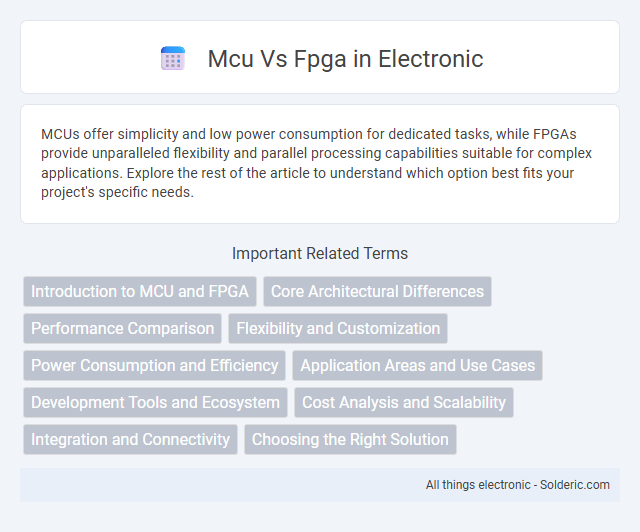MCUs offer simplicity and low power consumption for dedicated tasks, while FPGAs provide unparalleled flexibility and parallel processing capabilities suitable for complex applications. Explore the rest of the article to understand which option best fits your project's specific needs.
Comparison Table
| Feature | MCU (Microcontroller Unit) | FPGA (Field-Programmable Gate Array) |
|---|---|---|
| Architecture | Fixed, microprocessor-based | Reconfigurable logic blocks |
| Programming | Firmware in C/C++ | Hardware Description Languages (HDL): VHDL, Verilog |
| Performance | Moderate, suited for control tasks | High parallel processing, faster for complex logic |
| Flexibility | Limited hardware changes post-manufacturing | Highly customizable after manufacturing |
| Cost | Low cost, mass-produced | Higher cost, suitable for niche and prototyping |
| Power Consumption | Low power for embedded applications | Generally higher power consumption |
| Use Cases | Embedded systems, IoT devices, low to mid complexity | Signal processing, custom hardware acceleration, high complexity |
| Development Time | Shorter due to simpler programming | Longer due to HDL design and verification |
Introduction to MCU and FPGA
Microcontroller Units (MCUs) are compact integrated circuits designed to execute specific control tasks within embedded systems, featuring a CPU, memory, and peripherals on a single chip. Field Programmable Gate Arrays (FPGAs) consist of reconfigurable logic blocks and interconnects that allow custom hardware designs to be implemented after manufacturing, offering unparalleled flexibility for parallel processing. Understanding the fundamental architecture and application scope of MCUs versus FPGAs helps determine which technology best fits Your project's performance and customization requirements.
Core Architectural Differences
Microcontroller units (MCUs) feature a fixed, sequential instruction set architecture optimized for control-oriented tasks and low power consumption, utilizing a single or limited number of cores. Field-Programmable Gate Arrays (FPGAs) consist of an array of configurable logic blocks and interconnects, enabling highly parallel, customizable hardware configurations tailored for specific applications. The core architectural difference lies in MCUs executing software instructions on embedded processors, while FPGAs implement hardware-level parallelism through programmable logic.
Performance Comparison
MCUs typically offer lower clock speeds and processing power compared to FPGAs, which can run highly parallel tasks simultaneously at higher frequencies, resulting in superior performance for compute-intensive applications. FPGAs leverage customizable hardware logic blocks to execute multiple operations in parallel, significantly reducing latency and increasing throughput compared to sequential MCUs. Performance metrics such as execution speed, real-time processing capability, and power efficiency often favor FPGAs in applications requiring rapid, concurrent data processing.
Flexibility and Customization
MCUs offer limited flexibility due to fixed hardware architectures, making them ideal for standardized, cost-sensitive applications. FPGAs provide extensive customization options with reconfigurable logic blocks that allow tailored hardware implementations optimized for specific tasks and performance needs. This adaptability makes FPGAs suitable for prototyping, complex signal processing, and applications requiring real-time parallel processing capabilities.
Power Consumption and Efficiency
MCUs generally consume less power than FPGAs, making them ideal for battery-operated and low-power applications. FPGAs offer higher computational efficiency for parallel processing tasks but often at the expense of increased power consumption. Your choice between MCU and FPGA should weigh the balance between power efficiency and processing speed based on application needs.
Application Areas and Use Cases
Microcontrollers (MCUs) excel in embedded systems requiring low power consumption and real-time control, commonly found in consumer electronics, automotive systems, and IoT devices. Field-Programmable Gate Arrays (FPGAs) are suited for applications demanding high-speed processing and parallel computation, such as signal processing, telecommunications, and hardware prototyping. MCUs offer cost-effective solutions for standardized tasks, whereas FPGAs provide customizable hardware acceleration for complex, data-intensive operations.
Development Tools and Ecosystem
MCUs benefit from mature development tools and extensive ecosystems, including integrated development environments (IDEs) like Keil, MPLAB, and STM32Cube, which offer comprehensive libraries, RTOS support, and wide community resources. FPGA development relies on specialized tools such as Xilinx Vivado and Intel Quartus, providing hardware description language (HDL) synthesis, simulation, and advanced debugging capabilities tailored for programmable logic design. The MCU ecosystem supports rapid software prototyping and extensive middleware, whereas FPGA ecosystems emphasize hardware customization and scalable IP cores, influencing development complexity and time to market.
Cost Analysis and Scalability
MCUs generally offer lower initial costs due to their standardized production and widespread availability, making them ideal for low to medium volume projects. FPGAs, while having higher upfront expenses from development and tooling, provide superior scalability through reprogrammability and parallel processing capabilities, which reduce long-term costs in complex or evolving applications. Your choice depends on balancing immediate budget constraints against future flexibility and system scalability needs.
Integration and Connectivity
MCUs offer streamlined integration with built-in peripherals like ADCs, DACs, and communication interfaces such as I2C, SPI, and UART, enabling easy connectivity with sensors and external devices. FPGAs provide flexible, customizable interconnects and can implement complex communication protocols, supporting high-speed data transfer and parallel processing for advanced system designs. Your choice depends on whether you need predefined, low-power connectivity or highly adaptable, high-throughput integration.
Choosing the Right Solution
Choosing between an MCU and an FPGA depends on your project's complexity and flexibility requirements. MCUs excel in low-power, cost-sensitive applications with straightforward control tasks, while FPGAs offer customizable hardware acceleration and parallel processing for performance-critical designs. Evaluate processing speed, development time, power consumption, and scalability to determine the right solution for your specific application.
mcu vs fpga Infographic

 solderic.com
solderic.com